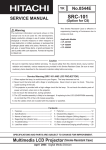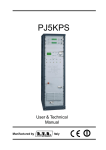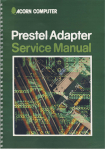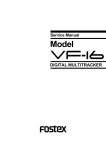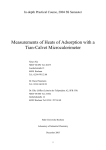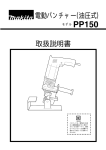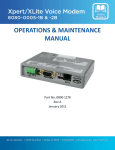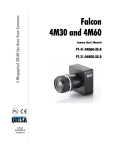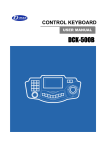Download G356E SERVICE MANUAL
Transcript
ELECTRONIC CASH REGISTER G356E SERVICE MANUAL DOCUMENT No. 5140-02-03 REV.01 TITLE : G356E SERVICE MANUAL PREPARED BY K. SAKAUE 2004/4/21 APPROVED BY COPY RIGHT 2004 BY JAPAN CASH MACHINE CO., LTD. 1 TABLE OF CONTENTS 1 Introduction ..................................................................................................................................................................1 2 Installation procedure..................................................................................................................................................1 2.1 unpacking ..............................................................................................................................................................1 2.2 Emergency cash drawer release...........................................................................................................................3 2.3 Preparation for use .............................................................................................................................................3 Dip switch setting....................................................................................................................................................3 Initial reset procedure.............................................................................................................................................3 Diagnostics...............................................................................................................................................................4 3 Theory of operation ......................................................................................................................................................5 3.1 system block diagram............................................................................................................................................5 3.2 circuit description..................................................................................................................................................6 3.2.1 power circuit ...................................................................................................................................................6 3.2.2 KEY BOARD CIRCUIT..................................................................................................................................7 3.2.3. display circuit ................................................................................................................................................8 3.2.4. printer drive circuit .......................................................................................................................................9 3.2.5. Comparator circuit ........................................................................................................................................9 3.2.6 Paper near end sensor circuit ......................................................................................................................10 3.2.7. Motor drive circuit(paper feed motor) ........................................................................................................ 11 3.2.8 cutter motor drive circuit ............................................................................................................................. 11 3.2.9. Battery charge circuit..................................................................................................................................12 3.2.10. PF circuit....................................................................................................................................................12 4 Trouble shooting ......................................................................................................................................................15 5 CONNECTOR LAYOUT OF CPU BOARD .........................................................................................................17 5.1 CONNECTOR TABLE......................................................................................................................................18 5.2 Standard inner cable pin assignment ................................................................................................................19 5.3 Optional cable pin assignment ...........................................................................................................................19 6 Appendix .....................................................................................................................................................................20 2 1 Introduction G356E consist of 5 block (1)Main CPU board Main CPU:M16C/80 Renesas device 16 bit MPU RAM 4M bit (battery back up) EPROM 4M bit CMOS (2) (3) (4) (5) Front display unit Rear display unit Key board unit Power supply unit 2 Installation procedure 2.1 unpacking The ECR packing method is shown fig 2-1. Unpack the ECR an check that the following items are present. (1) two rolls of thermal rolls 38mm (2) one journal Take-up reel (3) key set (4) G356E owners manual (5) Dust cover If the ECR was received in a damaged carton, unpack and inspect for physical damage immediately, As described in table 2-1. If damage is found, contact the freight carrier and file a claim promptly,. If any parts are missing, contact JCM within one week of receiving the ECR. Initial inspection Perform the appearance and mechanical checks as listed on table 2-1. The ECR cabinet can be detached by removing the three screw on the upper side of the cabinet. The two screw is on the printer side. And other one is under the customer display unit. It is concealed under a small cover. Table 2-1 Check List Inspection Appearance Mechanical check A. surface of cabinet , keyboard, and cash drawer for damage such as dents and scratches. B. display windows for damage such as cracks or scratches. A. all electrical connections for proper seating B. keys in mode lock for proper operation. C. Cash drawer for smooth operation when released manually. See selection 2.3 for release details. 1 2 2.2 Emergency cash drawer release In the unlikely event of a machine malfunction or a prolonged power failure, the model G356E is equipped with an emergency cash drawer release. The release is located on the rear underside of the cash drawer. To manually release the drawer, carefully lift one side of the ECR with your left hand and push the release tab with the other. Rear release BOTTOM VIEW FRONT FIGURE 2-2 2.3 Preparation for Emergency Drawer Release use Dip switch setting Dip switch is located on the front right corner of the main PCB. It is used for initialization and hardware configuration purposes. 1: ON initial reset OFF normal operation Initial reset procedure (a) Initial reset (1)set DIP sw1 to ON. (2)Power ON. Clears RAM work area only (current transaction) Does not effect totals/counters or program memory. Operation mode become “P” mode. (b) RAM clear(all clear) (1)Turn the mode lock key to the “P”mode. (2)Set DIP sw1 to ON (3)Power ON while depressing the tenkey ”1”. (4)All clear is displayed. Clears all Totals/counters and user programmed memory. Loads default operation program After all clear operation, you must preset the date and time in “X” mode. The machine does not work without setting date and time. 3 Diagnostics (1) turn the mode lock key to “P” position, or assign to “P” mode(4---key). (2) Enter xxxxxxxxx(9digit) --- #/NS 555555555-----#/NS automatic receipt issue at 3 minutes interval. 555555551-----#/NS automatic receipt issue at 5 second interval without cutter. 555555552-----#/NS automatic receipt issue at 5 seconds interval with cutter. 666666666-----#/NS communication port loop back test check the com. Port from 1 to 4. Following result message is printed Error2 RTS---CTS defect Error4 RxD ---TxD defect 777777777-----#/NS automatic printing test All characters are printed on receipt and journal automatically. You can do a check of printing quality. It’s terminated by depressing “CL” key 888888888-----#/NS key board test the display will show the each key s position number on the right side 2 digit various signal status will be showed each digit on the display. It’s terminated by depressing “CASH” key. For example(display) P 1 0 1 0 1 1 4 5 Key position code Journal near end sensor Receipt near end sensor Journal paper empty Receipt paper empty Head up switch Control key position 999999999-----#/NS version and check sum display The software version number and checksum of EP-ROM will displayed. For example(display) 1 - 0 0 E F 1 0 3 check sum destination spec. Version number 4 Section 2 3 Theory of operation 3.1 system block diagram Rear display 9 digits(VFD) SCOM1 Printer unit LTP 2w47 Cutter unit (option) ACU1224B0 DRAWER SCOM2 Front display 9 digit(VFD) POWER CIRCUIT 4M RAM SCOM4 MPU M16C/80 SCOM3 SWITCHING POWER SUPPLY (+24V) VFD driver E-PROM KEY BOARD 9 X 8 MATRIX CONTROL LOCK DRAWE R DRIVER 232C DRIVER PRINTER DRIVER CIRCUIT SCOM3,SCOM4 are reserved MAIN The ECR circuitry can be broken down into six major sections: MPU, Memory, Display, Key board, Printer, and power supply. The heart of this system consists of a M16C/80, Sixteen bit microprocessor implementing L.S.I, high speed, and low power consumption. Standard memory includes a 512k x 8 bit EPROM and a 512k x 8 bit static RAM chip. 5 3.2 circuit description 3.2.1 power circuit POWER VOLTAGE (+5V,-30V,VEE,,VF1,VF2) REGULATOR CIRCUIT After passing through the switching regulator. There is a +24V DC power via JP1. This power supply circuit employs fly back converter type switching regulator system. At the initial condition, as the level of point “I” is 0V, PQ4 keeps OFF condition. When +24V begins to rise up after power ON, the level of point “H” rises up and PQ1 turns ON. And then the power is applied to primary side of pulse transformer (PT1). When the power is applied to primary side of the PT1 , the level of point “I” (secondary side of the PT1 ) rises up, and if it is exceed the zenner voltage of PD11(+5V), PQ4 turns on and the level of point “H” becomes 0V. Therefore PQ1 is in OFF condition and supplement to primary input of PT1 is cut off, with that the level of point “I” becomes initial condition again and PQ1 turns ON. Thus , switching the supplement of power to primary side of PT1, secondary output(+5V,-30V,VF1,Vf2) is stable. The +24V DC pass through u1(LM2575S-5.0 voltage regulator)become Vcc-c steady. PC7 +24V PR4 68 682 PD20 PC6 S1B-SB PR7 PC16 22K 1000u 35V PR3 PT1 S097866 5 6 PD12 PC18 RS1B_R8 PD9 3.3K 1/4W PR6 15K 10V PC10 10V 0.1U 220 1/4W 1000U PS_+5V DSS310 PC12 100U 7 PR5 PNF3 PR11 C20 0.1U HZ36CPB 223K PD10 HZU12B2 1 10 PQ3 2SC3052 PR8 50V 100u 9 PD8 RS1B_R8 1.5K PD13 PL3 2 PQ1 BLM21PG600 0.1u HZU5.1 2SC3568K PC9 PR9 680 I PC22 100p 3 PC8 102 100V PD14 HZU5.1 8 2.2U 50V VF1 PC21 PR10 330 1/4W PQ4 2SC3052 PC11 50V -30V 100U PC19 PR12 0.1U 10K RS1B_R8 22K PD11 PC13 PC24 1000p PC23 100p VF1 PL4 4 BLM21PG600 PR13 3.3K 1/4W H 6 3.2.2 KEY BOARD CIRCUIT Input and output signal for key board scanning are passing through J1,J2 The output signals from output port (P110-P113) of U17 are encoded signals. By passing through U25,U26(74HC138), they are decoded to key scan signals. And they are applied to key matrix via J1. When a certain key is depressed, one of decoded signal is applied to buffer(U20:74HC245) via J2. Thus U17(MPU) recognizes which key is depressed and executes key’s specific operation. The scanning signals are also used for digit indicator signals for display tube as well. The scanning signal from U26 –Y0 scans control lines KR0-KR4 and they are applied to U17(MPU) as control signals. According to the status of control signals, U17(MPU) executes specific operation. 1 +5V J1 U25 1 2 3 2 3 4 5 P110 P111 P112 P113 A B C +5V 6 4 5 RA12 RA5-103J G1 G2A G2B 15 14 13 12 11 10 9 7 Y0 Y1 Y2 Y3 Y4 Y5 Y6 Y7 D1 D2 D3 D4 D5 D6 D7 D8 D9 1 2 3 4 5 6 7 8 9 KS0 KS1 KS2 KS3 KS4 KS5 KS6 KS7 KS8 74HC138 W-D0809#01 1 +5V Scan signal U26 1 2 3 6 4 5 D[0-7] A B C G1 G2A G2B 15 14 13 12 11 10 9 7 Y0 Y1 Y2 Y3 Y4 Y5 Y6 Y7 CA1 J2 RA13 KR0 KR1 KR2 KR3 KR4 KR5 KR6 KR7 /LOCK 9 8 7 6 5 4 3 2 2 3 4 5 6 7 8 9 KR0 KR1 KR2 KR3 KR4 KR5 KR6 KR7 1 2 3 4 5 6 7 8 74HC138 EXF-P8101 MPU Data bus 1 RA9-473J U20 +5V /CS1 D0 D1 D2 D3 D4 D5 D6 D7 1 19 2 3 4 5 6 7 8 9 W-D0808#01 DIR G A1 A2 A3 A4 A5 A6 A7 A8 B1 B2 B3 B4 B5 B6 B7 B8 18 17 16 15 14 13 12 11 KR0 KR1 KR2 KR3 KR4 KR5 KR6 KR7 D10 KR0 KR1 KR2 KR3 KR4 /LOCK J3 1 2 3 4 5 6 CONTROL LOCK 5267-06 Fig 3-1 key board circuit Timing chart of key scan signals P110 P111 112 P113 P114 Y0 Y1 Y2 Y7 5.48msec 7 3.2.3. display circuit Display signals are applied to the display circuit board via J4.. The display signals for digit indication are also used for key scan signals which are decoded At U25,U26(VHC138). The decoded signals from U25,U26 are amplified at U23,U24(driver:uPA80C) and applied to the display tube on display circuit board. The display signals for segment indication are output from port of CPU(P150-P157,P76,P77). They are amplified at U22,U23 (driver:uPA80C) and applied to the display tube on display circuit board. U22 7 6 5 4 3 2 1 SEGA SEGB SEGC SEGD SEGE SEGF SEGG -30V 8 I7 I6 I5 I4 I3 I2 I1 O7 O6 O5 O4 O3 O2 O1 VSS VCC L1 L2 L3 L4 L5 L6 L7 10 11 12 13 14 15 16 9 C70 UPA80C VF1 +5V 1 2 3 4 5 6 7 8 9 10 11 DET1 VF1 SEG K SEG P SEG G SEG F SEG E SEG D SEG C SEG B SEG A 0.1u U23 7 6 5 4 3 2 1 SEGP SEGK SEGL DG8 DG7 -30V 8 I7 I6 I5 I4 I3 I2 I1 O7 O6 O5 O4 O3 O2 O1 VSS VCC L8 L9 10 11 12 13 14 15 16 L10 L11 9 C69 UPA80C +5V 0.1u U24 7 6 5 4 3 2 1 DG6 DG5 DG4 DG3 DG2 DG1 DG0 -30V 8 I7 I6 I5 I4 I3 I2 I1 O7 O6 O5 O4 O3 O2 O1 VSS VCC UPA80C L12 L13 L14 L15 L16 L17 L18 10 11 12 13 14 15 16 9 C59 +5V 0.1u VF2 DISP SW 12 13 14 15 16 17 18 19 20 21 22 23 24 25 26 DG8 DG7 DG6 DG5 DG4 DG3 DG2 DG1 DG0 VF2 DET2 DISPLAY DRIVE CIRCUIT 26FE BT-VK-N 8 3.2.4. printer drive circuit Printer drive circuit consists of CPU(U17),U11,U12 and U9,U10 (driver), U13 (comparator) Usually, P142 outputs “L” level. When one of department key is depressed, CPU outputs printer power Signal “H”(PR_PWR) from output port P142 of U17. Q3and Q4 turn ON. Thus the thermal head On the printer mechanism is activated. Serial print data input from “PR_DAT” is transferred to the shift register synchronously with the Clock ”PR_CLK”, then stored in the latch register at the timing of the latch ”PR_/LA” signal. The heat elements which correspond to the latched print data are activated while each gate is on. The gates are on while each head activation signal (DST1 –DST4) is low. 3.2.5. Comparator circuit The thermal head has a thermistor for detect the head temperature. The level of the “TH_IN” is changed according to head temperature. When head is heated too high temperature, the output level of comparator goes to “H” level. Thus thermal head will be non-activity. This status is released when the head become cool. +24V R27 50V 100u 10K Q3 R28 2.2K 1/2W 2SB1100 L26 3 C31 Q4 DTC143EUA 2 1 J7 PR_PWR 1 VP 2 VP 3 VP 4 VP 5 DATA OUT 6 CLK 7 LATCH 8 DST2 9 DST1 10 TH 11 GND 12 GND 13 GND 14 GND 15 GND 16 GND 17 GND 18 GND 19 GND 20 GND 21 VDD 22 DST4 23 DST3 24 DATA IN 25 VP 26 VP 27 VP 28 VP U12B U12C 4 L27 3 6 74VHC14 U12A L28 2 5 1 8 74VHC14 L29 +5V 9 PR_/LA 74VHC14 U11A TH_IN PR_CLK 74VHC14 U12D 1 3 PR_/DST1 2 74VHC32 PRGND +5V U11B L20 L31 4 6 PR_/DST2 5 74VHC32 U12E L30 U12F 10 11 12 74VHC14 13 74VHC14 28FE-BT-VK-N 4.7K 4.7K R39 TH_IN 47K U13A 2 1 R40 +5V R42 4 R38 3 2.2K LM393 R41 R43 8 +5V 47K 220K 9 +5V PR_/DAT C 0 3.2.6 Paper near end sensor circuit This circuit detects paper near end of receipt and journal individually. The sensor is consist of a LED and a photo transistor. It attached under the bottom base. There are two windows in order to sense the roll paper, The light from LED reflect at the paper and be returned to the photo transistor. Thus sensor output level become “H”(about 4V) If paper roll slip out from holder, the light from LED cannot reflect, so the photo transistor cannot receive the return light. Thus sensor output level become “L”(about 0.3V) There is transistor on the CPU board in order to amplify the inputted signal. So the inputted signal is not stable, that Q7,Q8 amplify the signal to “0V” or “5V”. If paper roll slip out from holder, JNEND or RNEND will become to 5V. When paper roll is on the holder, JNEND or RNEND is “0V”. R72,R73 limit the current to supply to LED. +5V 4.7K 3 +5v R74 RNE C61 Q7 DTC114EUA 0.1u 2 R73 4.7K 3 JNE 330 330 Q8 DTC114EUA B8B-PH-K-S 2 C63 1000p 1 R75 +5v 1 C62 1000p J15 1 2 3 4 5 6 7 8 R72 PAPER NEAR END DETECT CIRCUIT 10 A K C E A K C E 3.2.7. Motor drive circuit(paper feed motor) After PF_I0,PF_I1 set to “L” level, the signal PF_PH1,PF_PH2 are sequentially changed for to feed the receipt paper. Similarly after JF_I0,JF_I1 set to “L” level, the signal JF_PH1, JF_PH2 are sequentially changed for to feed the journal paper. +24V +5V C25 0.1u JF PH1 JF_PH2 JF_I0 JF_I1 IC 8 11 3 13 1 12 2 C24 470p R26 56K R25 56K 9 VCC PHASE1 PHASE2 IO1 IO2 VBB OUTA OUTB OUT2A OUT2B RC1 RC2 17 14 +5V R24 12K 10 4 VREF1 VREF2 PGND FLM21AG121SNID L36 JF_/B JF_B L37 L38 20 23 +5V ZD33 ZD32 ZD31 ZD30 SS16 SS16 SS16 SS16 SENSE1 E1 ENSE2 E2 PGND 15 16 22 21 E4 GND1 GND2 GND3 GND4 L40 R19 220 JF_A JF_B JF_/A JF_/B PAPER SWJ HD_SW CNK_J 1 2 3 4 5 6 7 8 9 10 11 1K R23 R22 R20 C20 4700p 1K R21 23 6 7 18 19 UDN2916LB J6 JF_/A JF_A L39 470p C23 50V 100u I11 I12 PGND 5 C22 24 C21 4700p 3.9 1/2W PGND 3.9 1/2W PGND 3.2.8 cutter motor drive circuit Cutter unit have a motor and sensor switch(CUT_S). “CUT A” is used as motor ON signal. “CUT B” is used as motor brake signal. When receipt is issued, “CUT A” becomes to “H” then cutter motor begin to cut the receipt paper. Sensor switch detects the cutter position. After motor begin to cut the paper, switch becomes ON (CUT_S=”L”) until cutting is complet. When “CUT_S” goes to “H”, the machine brakes the cutter motor by make “CUT_B” to “H”. The brake time is about 100msec. Timing chart is following. CUT_A CUT_B CUT_S MOTOR J13 CUT A CUT B 1 2 4 IN1 MA IN2 MB GND Vcc 1 2 3 4 3 5 7 +5V 50V L25 TA8428K R68 CUT_S C39 0.1U CUTTER MOTOR DRIVE CIRCUIT C54 100U 1K 11 5045-0 3.2.9. Battery charge circuit When the power is turn on, D12 and D13 turn on, thus +5V is applied to VBB line and Recharge current is applied to the rechargeable battery via R31. When the power is turned off, D12 and D13 turned off, thus battery output is applied to VBB. When the power is turned off, battery output backs up the memory contents of RAM chip and CPU internal RAM. D13 PS_+5V +5V S1B_S8 C33 100u 10V VBB D12 R31 150 S1B_S8 C32 100u BT1 BATTERY 10V 3.2.10. PF circuit When the power is off, the PF is “L”. “H”. But when the power is on, the Q27,Q33 are turn on the PF is 1 +5V Q27 DTA143ZUA 2 3 3 PF D20 Q33 DTC124EUA 2 +24V R33 1K R32 1K C53 4.7u 1 HZU16B 50V +21.8V 24.4V 17.2V PF +5V signal 12 PF signal timing chart 13 4 Trouble shooting Phenomenon condition Considerable cause Check point/method Machine Printer doesn’t work AC power is not supplied Is AC power plug connected to outlet? doesn’t work after power on at all AC power is not applied to Is outlet voltage normal? switching power supply. Is fuse (primary side of switching Power supply? Is 24V output from secondary side of switching power supply? Is DC power voltage Does collector of PQ1 output oscillation normal? wave ? +24V is not generated Is PD11 defect? +5V is not generated. Crystal is not oscillating. Check wave form pin 20 and Pin 22 of U17(frequency 20MHz) The levels of PF lines don’t Is D20 defect? become “H” Are Date/time Date doesn’t Crystal(x2:32.768kHz) is Check wave form of pin 17 and pin 18 of data fails. increment. not oscillating properly. U17(frequency:32.768kHz) Date /time data doesn’t increment correctly Buzzer Trouble in buzzer circuit. When pin 8(P146)of U17 output “H”, doesn’t sound buzzer is driven. Is Q1 defect?. Drawer is not Drawer solenoid Trouble in drawer circuit When pin 29(P145)of U17 output “H”, opened doesn’t operate. drawer solenoid is driven. Is Q6 defect?. Abnormal Printed character is The level of timing signal is Is the signal level of pin 1(U13) stable? print out Not desired. not stable. Printer is defect. 15 Remedy Connect the plug to outlet. Replace the fuse Replace the switching power supply. Replace PQ1 Replace PD11 Replace converter transformer. Replace crystal(x1) Replace U17 Replace D20 Replace U27 and U33 Replace crystal(X2) Replace the buzzer. Replace Q1 Replace Q6 Replace U13 PHENOMEN CONDITION CONSIDERABLE ON CAUSE Printer Printer motor doesn’t Is the head unit over heat? doesn’t work rotate at all Stepping signal does not generated. CHECK POINT/ METHOD When the head is over heated, printing is stop. Is the stepping signal output from P13X(U17)? Is the stepping signal output from U9 or U10? does DC power for print head When pin12(P142) of U17 outputs “H” , unit is not output the head become active. Printer feed Printer motor the paper work correctly without printing Abnormal Display doesn’t light display The FPC for CPU and FD units connection is broken Display voltage(-30v) is not generated Filament voltage (VF1,VF2) is not generated. Center tap voltage of filament is not correct. Display tube is broken. are Cut off voltage is generate from PD21 Trouble in FD driver. Some ghost displayed. Specific digit Key input correct is not lit correctly Specific Display data and time segment is data are correct. not lit correctly Key input Specific key input cannot be cannot be accepted. accepted Check conduction of FPC. REMEDY Wait for head becomes cool. Replace U17 Replace U9 or U10 Replace Q3,Q4. Replace FPC Is PD13 defect? Replace PD13 Replace converter transformer Check the voltage between VF1 and Replace converter transformer VF2(tolerance3.46Vrms) Is the cathode voltage of PD14-23.5V? Replace PD14. Is the display tube cracked? Is cathode voltage of PD14 –23.5V? Replace the display tube Replace PD14 Check the condition of the FPC Replace FPC Replace U23,U24 Trouble in segment drive. Check the condition of the FPC. Replace FPC Replace U22 2 key are depressed together Control mode is lock position Diodes (D1-D9) are defect. Check whethe r any key keeps depressing. Replace key board unit. When control lock is released, lock signal is applied to KR lines(KR0-KR4) Check the diode on the output line of specific key’s key matrix. Replace D10 Check conduction of the control key. Check diode on key Matrix output. 16 Key depressing section is defect. CONNECTOR LAYOUT OF CPU BOARD W IN D J12 30 1 DRW 16 15 FIS C A L J14 J10 N EN D J15 J7 1 2 J M O TO R J6 J9 J5 TH ER M A L H EA D ON R M O TO R JP 1 J2 J11 D IS P LA Y KR J4 J3 C T LK E Y 17 J1 KSCAN BZ J16 P O W ER 4 M O C C U TTER 3 M O C J8 S1 2 M O C 1 pin side 1 M O C 5 Replace key depressing section 5.1 CONNECTOR TABLE J1 KEY SCAN Pin Signal 1 KS0 2 KS1 3 KS2 4 KS3 5 KS4 6 KS5 7 KS6 8 KS7 9 KS8 J2 key return Pin signal 1 KR0 2 KR1 3 KR2 4 KR3 5 KR4 6 KR5 7 KR6 8 KR7 J4 DISPLAY Pin signal pin Signal 1 DET1 14 DG 6 2 VF1 15 DG 5 3 SEG K 16 DG 4 4 SEG P 17 DG 3 5 SEG G 18 DG 2 6 SEG F 19 DG 1 7 SEG E 20 DG 0 8 SEG D 21 VF2 9 SEG C 22 DET2 10 SEG B 23 NC 11 SEG A 24 NC 12 DG 8 25 NC 13 DG 7 26 NC J3 CTL LOCK Pin signal 1 SCAN 2 KR0(R) 3 KR1(X) 4 KR2(Z) 5 KR3(P) 6 KR4 J5 R motor Pin Signal 1A 2B 3 /A 4 /B 5 /PS 6 PS 7 GND 8 NC 9 NC 10 CNN_R 11 GND J6 J motor Pin Signal 1A 2B 3 /A 4 /B 5 /PS 6 PS 7 GND 8 NC 9 NC 10 CNN_J 11 GND J7 thermal head Pin signal pin signal 1 VP 15 PGND 2 VP 16 PGND 3 VP 17 PGND 4 VP 18 PGND 5 DATOUT 19 PGND 6 CLK 20 PGND 7 LATCH 21 VCC 8 DST2 22 DST4 9 DST1 23 DST3 10 TH 24 DATIN 11 PGND 25 VP 12 PGND 26 VP 13 PGND 27 VP 14 PGND 28 VP J8 SCOM1 Pin Signal 1 Vcc 2 CTS 3 RTS 4 RxD 5 TxD 6 GND J11 POWER pin Signal 1 +24V 2 +24V 3 GND 4 GND J12 Wind pin Signal 1 (+) 2 (-) J13 cutter pin signal 1 CUT A 2 CUT B 3 GND 4 CUT S J14 drawer pin signal 1 SOL+ 2 SOL3 GND 4 SW J15 near end pin signal 1A 2K 3C 4E 5A 6K 7C 8E J16 SCOM3 Pin Signal 1 Vcc 2 CTS 3 RTS 4 RxD 5 TxD 6 GND J17 SCOM4 Pin Signal 1 Vcc 2 CTS 3 RTS 4 RxD 5 TxD 6 GND 18 J9 SCOM2 Pin Signal 1 Vcc 2 CTS 3 RTS 4 RxD 5 TxD 6 GND 5.2 Standard inner cable pin assignment SCOM1 WI-906 (for DOS/V pin assign hand scanner) J8,J9,J16,J17 signal Dsub 9pin(male) 1 Vcc 9 2 CTS 8 3 RTS 7 4 RxD 2 5 TxD 3 6 GND 5 Signal Vcc CTS RTS RxD TxD GND SCOM2 WI-907 (for DOS/V PC communication) J8,J9,J16,J17 signal Dsub 9pin(male) Signal 1 Vcc N.C 2 CTS 8 CTS 3 RTS 7 RTS 4 RxD 2 RxD 5 TxD 3 TxD 6 GND 5 GND It can be connected with scanner which have DOS/V pin assign connector directly. 5.3 Optional cable pin assignment WI-837N(for GP965 slip printer) J8,J9,J16,J17 Signal 1 Vcc 2 CTS 3 RTS 4 RxD 5 TxD 6 GND Dsub 9pin(female) 6 5 4 3 2 1 Signal Vcc CTS RTS RxD TxD GND Inner cable pin assign for hand scanner ZE84RMD4JK(Panasonic) Wi-908 J8,J9,J16,J17 Signal Dsub 9pin(female) Signal 1 Vcc 9 Vcc 2 CTS 1 CTS 3 RTS 4 RTS 4 RxD 2 RxD 5 TxD 3 TxD 6 GND 7 GND Interface cable for between G356 and the hand scanner ZE84RMD4JK(Panasonic) WI-1370 SCOM Signal Dsub 9pin(female) Signal side(female) 9 Vcc 9 Vcc 8 CTS 1 CTS 7 RTS 4 RTS 2 RxD 2 RxD 3 TxD 3 TxD 5 GND 7 GND Interface cable for between G356 and the GP965 WI-1369 SCOM Signal Dsub 9pin(female) side(female) 19 Signal 9 8 7 2 3 5 Vcc CTS RTS RxD TxD GND 6 5 4 3 2 1 Vcc CTS RTS RxD TxD GND Application case 1. G356-----DOS/V scanner It can be connected directly. 2. G356-----Panasonic scanner (ZE84RMD4JK) Case1: Please exchange the inner cable WI-908 with WI-906. WI-908+SCANNER Case2: please use the interface cable WI-1370. WI-906+WI-1370 3. G356-----DOS/V PC It can be connected directly by the cross cable. 4. G356-----GP965 Case 1: Please exchange the inner cable WI-907 with WI-837N WI-837N+ GP965 Case2 : please use the interface cable WI-1369. WI-906+WI-1369 (SCOM1) or WI-907+WI-1369 (SCOM2) 6 Appendix Number of PLU & PB actually maximum occupation PLU 12 char. 9269 PLU 20 char. 7657 PLU 15 char. 7657 PB 7657 Paper near end level Point Paper yes J15-8 4.71 JNEND 9.3mV J15-4 4.13 RNEND 10.7mV No paper 0.320 5.02 180.9mV 5.02 HARD RESET procedure (1) remove the cabinet (2) DIP SW1 ON (3) Power ON (4) Short the JP1 on the CPU board. (5) After few second display will light. (6) If “E006” appear on the display, off the power and execute the “ALL CLEAR”. 20






















